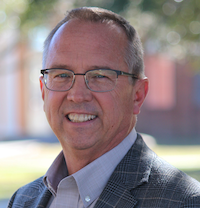Richard Elligson
Richard Elligson earned a PhD in Theology from Mid-America Baptist Theological Seminary. Archives

Richard Elligson earned a PhD in Theology from Mid-America Baptist Theological Seminary. Archives
Session 6
February 23, 2025
THE GATHERING FOR WORSHIP
Hebrews 10:19-25; 13:12-15
The final lesson in this Heart of Worship series begins in the classic text of Hebrews 10. The book is a masterpiece of comparisons and contrasts built around the theme that “Jesus Christ is better.” In the opening chapters, Jesus is better than the prophets, better than the angels, better than creation, and better than the Old Testament sacrificial system. By chapter 10, the writer (whom I am still traditional enough to name Paul!) has demonstrated the greatness of the Law, but the ineffectiveness of sacrifice: “For it is not possible that the blood of bulls and of goats should take away sins” (v. 4). That which the law could not do, Jesus did! And He did it one time for all (v. 12). It is because of this great feat—salvation through His once-and-for-all atoning sacrifice—that the saved are compelled to worship. In this lesson, we see the motivation for worship and the mission for worship.
Why we come to worship (10:19-25). This section is rich in Old Testament sacrifice imagery. And the Lord Jesus permeates it! He is the tabernacle and temple, the sacrifice and the priest. His flesh is the veil, and the brazen altar is the old rugged cross. Because of His atoning sacrifice we have access to His very presence. The holy of holies that was once solely the domain of the high priest, one day per year, bearing the blood of a goat, is now wide open. The veil that kept mere men out has now been torn (vv. 19-20). And as believers, we are all priests (see 1 Pet. 2:9) serving under Christ, who reigns as high priest. Verses 22, 23, and 24 all begin with the exhortation, “Let us...” First, is the exhortation to “draw near” (v. 22). Proximity to God that was once forbidden (see Ex. 19:23), is now open to all. The worship experience e
nables believers to draw close to Him. Verse 22 also explains how we are to do that: with sincerity, faith, a clean conscience, and bodily purity. These, by the way, are all demonstrated by the priestly ritual on the Day of Atonement (see Lev. 16). The second “Let us…” is to “hold on to the confession of our hope without wavering” (v. 23). I think the idea here is one of commitment. By attending worship, we are reminding the household of faith that we are still committed to Christ and His work, while at the same time confessing to those outside the faith that we are still fully committed to our Lord “without wavering.” The third “Let us…” is aimed at our commitment to the fellowship of believers. The idea is that church is the place to express our Christian love and exercise our spiritual gifts (Eph. 4:12). I have often commented how hard it is to carry out the “one another” commandments in the Bile when we don’t even want to be with one another! Notice the barb buried in verse 25. It seems that even in the early church, there were those who chose to stay home on Sunday morning! But rather than easing up on our church attendance, we ought to be more and more committed as we see the Lord’s return getting nearer. For reflection: What are some other reasons that believers ought to be faithful in worship? What happens when we are not?
How we leave from worship (13:12-15). We must remember that Hebrews was written primarily to Jews who had one foot in the Old Testament temple and one foot in the New Testament church. The writer is preaching encouragement for them to leave the Old Testament trappings once and for all and embrace Christ, the better way. The image of verse 12 is again, Christ’s sacrificial death. Just as the burnt offerings were made outside of the temple, Christ died on a hillside outside of the city. The implications are clear and marked by two additional “Let us…” exhortations. The first is to break out of the exclusionary mindset of Judaism (v. 13). Christ fulfilled the Old Testament sacrificial promises and moved beyond them, taking the gospel to the world. So we too, are to join Him “outside.” Second, “let us continually offer up to God a sacrifice of praise” (v. 15). Worship, therefore, should prepare us and motivate us to carry the gospel to those on the outside who have never heard it. And all this should be done with lips filled with praise (v. 15). For reflection: How does an attitude of praise affect our efforts to win the world to Christ?
Session 5
February 16, 2025
THE LIFESTYLE OF WORSHIP
Colossians 3:1-5.12-17
We know that the Apostle Paul told the church to “Pray without ceasing” (1 Thess 5:17). But what about worship? Are we ever told to “worship” without ceasing? While that exhortation is never specifically stated, the entire Bible loudly proclaims that worship is our #1 priority. The most renown statement of the Westminster Shorter Catechism of 1647 comes as the answer to its first question, “Man’s chief end is to glorify God, and to enjoy Him forever.” And that sounds like “Worship without ceasing” to me! This week’s lesson focuses on making our lifestyles examples of glorifying God in our regular routines and enjoying Him in the here-and-now. Paul’s exhortation comes in three themes.
Worship is displayed in our thoughts (vv. 1-5). We would like to think that our thoughts always precede our actions. Unfortunately, we too often act before we think, and that kind of impulsive behavior gets us into trouble. Here, we are reminded to intentionally train ourselves to focus our thoughts on the Lord. The apostle gives three reasons to do this. First, our focus should be on things above, because Christ is above (v. 1). To glorify Him we must seek Him in His glory, seated at the right hand of the Father (See Mark 16:19, Heb. 1:3, et al). Second, we are to “set our minds” on Him (v. 2). The word is stronger than seeking and means to observe; consider; or study. But the most important aspect of this is at the end of the verse, where Paul distinguishes between “above,” where Christ is, and on earth, where we are. Simply put, we should refocus our affections from here to there. Third, we ought to focus our thoughts away from this world, because we have “died” to it (v. 3). For the believer, old things have passed away, and all things have become new (2 Cor. 5:17); and that includes our thoughts. Finally, Paul tells how to do all this: by “putting to death” those things associated with our “worldly nature.” (v. 4. See also Gal. 2:19-20). For reflection: If worship is an action, how can it be affected by our thought life? What part of worship (if any) nurtures this kind of “above” thinking?
Worship is displayed in our attitudes (vv. 12-15). To be fit for worship, some things must be put to “death” and some things must be “put away” (v. 8). But it’s not enough to strip away the old. Now it’s time to “put on” the new. The list of positive attributes in these verses contains attitudes and affections. Notice that these attitudes begin in us but are expressed outwardly toward others; and we are to wear them like clothes. Notice as well that while each item is distinct and separate, they are bound together by the “belt” of love. Hence, when it all comes together, the different pieces form one stunning outfit! (see also Eph. 4:3). Verse 15 is a reminder that these expressed, outward, and godly attitudes must still be controlled by a heart filled with godly peace. For reflection: Read Phil. 4:7. What does this verse add to our discussion? And how does all this apply to our worship?
Worship is displayed in our fellowship (vv. 16-17). In previous lessons, we mentioned the necessity of corporate worship as well as private. Here, the emphasis is definitely on corporate worship. Notice the variety of worship activities mentioned in verse 16: teaching, admonishing (or “warning”), singing psalms (which are Scripture songs), hymns (sacred songs directed to God) and spiritual songs (simple songs like choruses). Notice as well, this atmosphere of praise is founded on the word of God and expressed with gratitude toward God. For this reason, all of it should be done in His name and for His glory. For reflection: As you think about your own worship experience, how is God’s word incorporated? What might make your worship service more Bible-based, and gratitude focused?
Session 4
February 9, 2025
THE BENEFITS OF WORSHIP
Psalm 63:1-11
There’s a joke I remember from long ago. It seems a man woke up on Sunday morning and said to his wife, “I don’t feel like going to church today. Some of the people there are downright mean. Nobody seems particularly interested in being there. It seems like everybody is complaining about something. Can you give me just one good reason why I should get up and go?” “Well,” she replied, “you are the pastor.”
“I don’t feel like going to church today.” That’s a sentiment we have all felt, even in the pastorate! Yet the reality is that fewer and fewer people feel the need to attend church, and fewer and fewer people do. The last time I checked, the major polling data reported that the average “active” church member attended worship just twice a month. In Psalm 63, David expresses three key aspects of worship. While the context is more personal than corporate, the principles certainly apply to both.
Desperation brings satisfaction (vv. 1-5). I must be honest and confess that I can’t remember hungering after God the way that David did. Here, he demonstrates an utterly desperate desire to experience God’s presence (see also Ps. 42). Yet the Bible is replete with encouragements to seek after God, and to do so with utter commitment. In Jeremiah, God said, “You will seek Me and find Me when you search for Me with all your heart” (Jer. 29:13). Notice the descriptions David uses: he “eagerly seeks” for God; he “thirsts” for Him; and his body “faints” as though he was stranded in a desert that was (emphatically) “dry, desolate, and without water.” His remedy for this is not to complain to God in his misery, but rather to “gaze” on Him in awe. The word “gaze’ means more than to see; it means to see and understand. Finally, look at the contrast between David in the desert and God in His glory. David is weak, parched, and exposed in the desert; God is strong, faithful, and loving in His sanctuary. David’s weakness led to lifted hands; his parched lips to praise; and his utter desperation to joyful satisfaction. For reflection: How does David’s desperation for God strike you? Do you think we only hunger for God like that when we are in trouble? Or maybe when we need something?
Meditation brings protection (vv. 6-8). The context here is clearly personal, private devotion. Unfortunately, a lot of people use the concept of personal, private worship as a substitute for attending church. But worship should be a “both/and” not an “either/or” proposition! In fact, both are necessary (see Heb. 10:25). Verse 6 describes the context of David’s worship. The fact that he is enamored by the “night watches” is not surprising, for the author is the same shepherd-king who once declared, “The heavens declare the glory of God, and the sky proclaims the work of His hands.” Here, the emphasis is not on God’s revelation but rather His protection. God is David’s “helper” (v. 7). Security is found in the “shadow of His wings,” and when he stays close, his God “steadies” him with a strong right hand. For reflection: The distinguishing phrase “right hand” is used 108 times in the Bible. What do you think is the significance of the “right hand?” What about God’s right hand?
Dedication brings justification (vv. 9-11). Finally, David turns to public expression. The construction is awkward, as verses 9 and 10 suddenly attack David’s enemies. But the overall theme is not the superiority of David’s position as king; rather it is the superiority of His God over all others. Quite simply, David declares that the pagan armies will end up dead and buried (v. 9) as a result of God’s powerful sword. What’s worse is that their shallow graves will be easy pickings for the wild jackals that notoriously dug them up and devoured their remains (v. 10). Verse 11 concludes the thought and the Psalm. “The king” is of course David himself. He will rejoice in His God and those who join him will share in his victory. For reflection: Read Rom. 8:33-37. How does this New Testament text related to our Old Testament discussion?
Session 3
February 2, 2025
THE ATTITUDE IN WORSHIP
Psalm 40:1-11
I have always been a little critical of church experiences that attempt to cram as much as possible into a Sunday morning service. The intention is certainly good: you have a limited amount of time to make as much spiritual impact as possible. Therefore, pack it full so that every minute counts, right? The problem is that the final product often feels rushed. While I certainly agree that worship should leave us breathless, should it leave us out of breath as well? Compare today’s paradigm with that of David. Notice his patient, reverent encounters with God, like that found in Psalm 40. There is a quiet breathlessness demonstrated here that doesn’t require choreographed set changes or high-energy praise bands. His worship encounter can be summarized in four key words.
He waited (vv. 1-3). The Bible balances God’s omnipresence with man’s requirement to still seek Him (see Is. 55:6). Yet here, David is pictured as waiting for God. The Hebrew construction is emphatic; literally, he “waited waiting.” But the remainder of verse 1 reveals that David had already been seeking God with his cries! Here, he is waiting for God to answer. Anyone who has been confined to God’s “waiting room” knows both the frustration and the joy such experiences bring. In verses 2 and 3, David’s patience paid off with five great responses: (1) God turned; (2) God heard; (3) God saved; (4) God secured; and (5) God gave a song. As in every good worship encounter, the supplicant is changed through that encounter. Notice how David was changed in verse 3. His deliverance not only put a new song in his heart, but a fresh witness on his lips. For reflection: If God is everywhere, then why do you think we are still required to seek Him? And how do we know when we have found Him?
He contemplated (vv. 4-5). Here, David’s outward joy is matched by his inward reflection. That too, is an expression of worship. Looking back on his experience with God, David is moved by God’s goodness. First, he reflects on how happy he is that he didn’t give in to his own impatience and turn to human wisdom in his time of need (v. 4). Then he reflects on God’s unwavering faithfulness (v. 5). Notice his recognition of both past blessings (“You have done many things”) and future blessings (“Your plans for us”). In every case, the glory goes to God. For reflection: Christian faith is not blind faith, but faith based on evidence. Why do you think David had such confidence in God?
He consecrated (vv. 6-8). Here, David’s contemplation has led him to deeper consecration. Verse 6 echoes Samuel’s confrontation with King Saul in 1 Samuel 15:22, “Behold, to obey is better than sacrifice, and to hearken than the fat of rams.” What God really wants through legitimate worship is deeper commitment; and deeper commitment is expressed in obedience. The Lord Jesus demonstrated this in both word and deed. In word, Jesus said, “If you love Me, keep My commandments” (John 14:15); and by example, He always did “those things that please” the Father (John 8:29). In fact, He seems to be the subject of verses 7 and 8. For reflection: Can you see a messianic overtone in verses 7 and 8? What other principles can you gather from these verses?
He proclamated (vv. 9-11). I know that “proclamated” is not a word, but it seemed to fit, so I used it! So often in the Psalms (and particularly with David’s), inward contemplation and deeper consecration spill into outward proclamation (see also Ps. 51:13). And that, too, is an expression of genuine worship. Here, David’s proclamation is all about the character of God. He is righteous; He is faithful; He is saving; He is constant in love and truth; and He is compassionate. Again, this proclamation is not an attempt to flatter God, but to honor Him. And that really is the purpose of worship. For reflection: The commission of each church is to reach its community with the gospel. That means that each church will express itself in a unique way. The important thing is that God is honored for who He is, and what He has done.

Margaret Colson began serving as consulting communications editor for the Florida Baptist Convention in April 2022, but she has a long history of working with Florida Baptists in telling the story of how God is at work in the Sunshine State.
Margaret earned a Bachelor of Arts in journalism from the University of Georgia and a Master of Divinity and Doctor of Ministry from New Orleans Baptist Theological Seminary. She is a leader in denominational communications, serving as executive director for Baptist Communicators Association as well as for Association of State Baptist Publications. She is married to Keith Colson.

Keila earned a B.S. in Communications from Florida International University in Miami. She writes news and stories about Florida Baptist churches, creates and posts social content to the FBC’s social media channels, and is a Baptist Press contributor.
When she’s not working, Keila enjoys bike rides and spending time with her family.

Brooke Mannion is a Pensacola native and longtime member of Hillcrest Baptist Church. She is a graduate of University of West Florida and has a diverse work history in advertising, interior decorating and accounting. Now she finds joy as a wife and stay-at-home mom of three children. Brooke enjoys home schooling, cooking, connecting with others and studying God’s Word.

David Moore has been writing and editing for newspapers and magazines in Florida for more than 20 years. He has a bachelor’s degree in journalism from the University of Florida. A proud member of First Baptist Church of Ocala, David serves in the worship, deacon and NextGen ministries. He and his wife Beth have three children.

Jessica received her B.S. in Biblical Studies from Southwestern Baptist Theological Seminary. She contributes to Florida Baptist Conv, Biblical Woman, Baptist Press, The Devotional for Women, and Daily Devotional Bible for Women. Her greatest joy is serving beside her husband who is the Senior Pastor of Fellowship Church.
